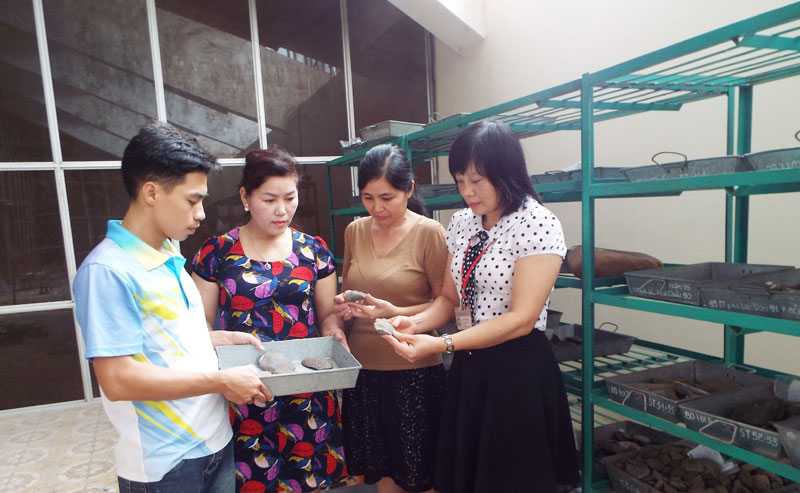
(HBO)- On the occasion of the 85th anniversary of the world recognition of the "Hoa Binh Culture”, Hoa Binh province will organise numerous activities to popularise and honour the unique archaeological values of the world-renowned Stone Age culture in the province. Hoa Binh Online reporters had a talk with Buil Ngoc Lam, Director of the provincial Department of Culture, Sports and Tourism and head of the organising board for commemoration activities.

Provincial museum staff arrange artefacts for an exhibition on the
occasion of the 85th anniversary of world recognition of "Hoa Binh
Culture”
Reporter: Could you give a general
introduction about the "Hoa Binh Culture”?
Mr. Bui Ngoc Lam: The term "Hoa Binh Culture” is used with two meanings, one of which is
the culture of all ethnic groups in Hoa Binh, and the other is the
archaeological culture.
Here we are talking about the
archaeological culture which dates back to the Stone Age, from 3,500-7,000
years ago.
The Hoa Binh Culture was first
discovered and studied by French woman archaeologist Madeleine Colani in the
years from 1926-1931. She also coined the term Hoa Binh Culture. In 1932, at
the first conference on the prehistory in the Far East held in Hanoi, world
archaeologists agreed to adopt this term.
However, the Hoa Binh Culture existed
not only in Vietnam. In fact, it covered a large area in Southeast Asia, but
Vietnam was the place with the most relics of the culture, so many foreign
scientists considered the country as the birthplace of Hoa Binh Culture. In
Vietnam, Hoa Binh province is the place where the first relic of Hoa Binh
Culture was found, and it is also home to the most relics discovered so far,
that is why the province’s name was used to call the culture.
Reporter: On the 85th anniversary of
world recognition of "Hoa Binh Culture”, the province will organise many
commemorative activities. Could you please tell us about the meaning and
significance of the anniversary?
Mr. Bui Ngoc Lam: Among commemorative events there will be an exhibition on the Hoa Binh
Culture, which will last through December. The provincial library will host a
display of books on the Hoa Binh archaeological culture and the cultures of
ethnic groups in Hoa Binh province. At the provincial cultural palace, there
will be a display of photos selected during the Hoa Binh tourism photo contest
in
2017. Ascientific seminar on Hoa Binh Culture will also be held here, along with an
art performance and a demonstration of Mo Muong.
Activities to celebrate the 85thanniversary of world recognition of "Hoa Binh Culture” are intended to
popularise and honour the unique archaeological values of the world-renowned
Stone Age culture in Hoa Binh; honour the great contributions of the French
archaeologist Madeleine Colani who discovered and named the culture. The
activities also aim to foster the pride about the ethnic groups in the province
– the cradle of the Hoa Binh Culture and one of the cradles of human kinds’
civilisation, and teach young generations about the local traditions.
Reporter: Thank you very much.
With an increasingly vibrant and widespread emulation movement aimed at building cultured residential areas and cultured families, Yen Thuy District has been making steady progress toward improving both the material and spiritual well-being of its people, while fostering a civilized, prosperous, beautiful, and progressive community.
Once lacking recreational spaces and community facilities, Residential Group 2 in Quynh Lam Ward (Hoa Binh City) has recently received attention for the construction of a new, spacious, and fully equipped cultural house. The project followed the model of state support combined with public contributions in both labor and funding.
The "All people unite to build cultural life" movement, which has been effectively integrated with Kim Boi district’s socio-economic development goals, is fostering a lively spirit of emulation across local residential areas, hamlets, villages, public agencies, and enterprises. In addition, through the initiative, traditional cultural values are being preserved and promoted, while community solidarity and mutual support in poverty reduction and economic development are being strengthened.
A working delegation of the Hoa Binh provincial People’s Committee led by its Permanent Vice Chairman Nguyen Van Toan on June 11 inspected the progress of a project to build the Mo Muong Cultural Heritage Conservation Space linked to tourism services in Hop Phong commune, Cao Phong district.
Born and growing in the heroic land of Muong Dong, Dinh Thi Kieu Dung, a resident in Bo town of Kim Boi district, in her childhood was nurtured by the sweet lullabies of her grandmother and mother. These melodies deeply imprinted on her soul, becoming an inseparable part of her love for her ethnic group's culture. For over 20 years, this love for her hometown has driven Dung to research, collect, and pass down the cultural values of the Muong people to future generations.
In the final days of May, the Ethnic Art Troupe of Hoa Binh Province organized performances to serve the people in remote, mountainous, and particularly disadvantaged areas within the province. These were not just ordinary artistic shows, but they were the meaningful journeys aimed at spreading cultural values, enhancing the spiritual life of the people and contributing to the preservation of ethnic minority cultural identities.



